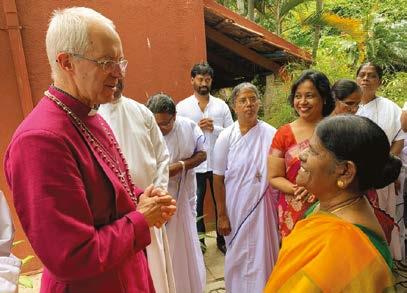This is part five of a five part series written by USPG entitled Living with a World of Difference, celebrating diversity within the anglican community.
Opening Prayer
Hold a short time of silence together to still your minds and recall God’s presence, and then pray aloud together:
Lord Jesus, I am happy you made my neighbour different from me.
I need all my neighbours to teach me about you
for my neighbour knows many things I do not know.
Help me to love my neighbour as I love myself. Amen.
From Melanesia
Key Text: Acts 2:1-12
Introduction
Across the Anglican Communion, many churches have long benefited from the experience of multilingual parishes. One such experience in the Church of England is Holy Trinity with St Matthew in South London. The vicar, the Revd Hugo Adán-Fernández, leads a fully bilingual parish, right at the heart of a Spanish-speaking community in south London. He is also Hispanic Diocesan Missioner for the Diocese of Southwark. He reflects on the positives of his parish and the challenges for the Church of England:
Story from England
St Matthew’s is completely bilingual. Our PCC, our churchwardens and everything we do, discuss and produce responds to this reality. In our parish, Spanish and English are equally official, promoted and encouraged. This goes beyond offering services in two languages – our structures are bilingual.
Being part of the Church of England with its approach to ecclesial multiculturalism means that St Matthew’s enjoys the benefits of such an approach but also suffers from its weaknesses. The Church of England is not monochrome: we have all ‘colours and tastes’ from Evangelicals to Catholics, from liberals to conservatives, with all sorts of tones in between. The ability to hold together such diversity places the Church in an unusual
place in society. I believe this is one of our main strengths.
What is happening at St Matthew’s is possible because the Church sees
diversity as a Gospel value. But there are challenges too. The Church of England is the national church but sometimes it’s not clear what we mean by ‘national’. I think we need to keep reflecting theologically about the identity of Anglicanism within our Church. Sometimes it’s unclear if we are called to be Anglicans – or to be English! I remember going to a conference for candidates for the priesthood. People had come from across Europe. The speaker was trying to explain the meaning of being a Church of England minister. The focus was English history. Not a word was said about multiculturalism. St Matthew’s is trying to go beyond this model. This is a real adventure and we are investing lots of energy to make it
a success.
Questions
- The congregation of St Matthew’s clearly speak different languages: Spanish and English. Do you know how many languages are spoken in your church or community, and in what ways do you reach out to different language groups?
- In some congregations differences in language are more subtle: some people may be more comfortable with one type of liturgical language or musical style than another in worship. What are some of the practical ways that we might celebrate the different ‘colours and tastes’ within one church community?
- Revd Hugo challenges us to reflect theologically on the identity of Anglicanism. What might your church community bring to this discussion?
Bible Reading
Acts 2:1-12
When the day of Pentecost had come, they were all together in one place. And suddenly from heaven there came a sound like the rush of a violent wind, and it filled the entire house where they were sitting. Divided tongues, as of fire, appeared among them, and a tongue rested on each of them. All of them were filled with the Holy Spirit and began to speak in other languages, as the Spirit gave them ability. Now there were devout Jews from every nation under heaven living in Jerusalem. And at this sound the crowd gathered and was bewildered, because each one heard them speaking in the native language of each. Amazed and astonished, they asked, ‘Are not all these who are speaking Galileans? And how is it that we hear, each of us, in our own native language? Parthians, Medes, Elamites, and residents of Mesopotamia, Judea and Cappadocia, Pontus and Asia, Phrygia and Pamphylia, Egypt and the parts of Libya belonging to Cyrene, and visitors from Rome, both Jews and proselytes, Cretans and Arabs – in our own languages we hear them speaking about God’s deeds of power.’ All were amazed and perplexed, saying to one another, ‘What does this mean?
Questions
- One of the gifts of the Holy Spirit of Pentecost was to transmit the message of Jesus to a diverse range of people. How might the church in the 21st century use different methods and technologies to communicate the Gospel afresh today?
- How practically is your church engaged in communicating the Good News, both in speech and action, with marginalised communities, and what more could be done?
Closing Prayer
Pray the Lord’s Prayer aloud, inviting each person to choose their preferred language.
Have a time of silence, followed by an opportunity to pray aloud any issues that have arisen during the session. Conclude by praying aloud together:
Blessed be God in the joy of creation.
Blessed be God in the sending of Jesus.
Blessed be God in the work of the Spirit.
Blessed be God in martyr and saint.
Blessed be God in the spread of the gospel to every race and every land.
Blessed be God in the church of our day in its preaching and witness
and its treasures of grace.
Blessed be God who has called us to mission
who forgives and who heals and is strength in our weakness. Amen.
USPG
